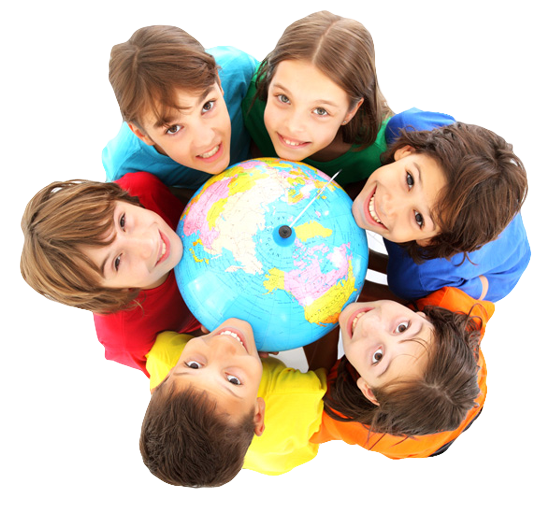The programme incorporates local and global issues into the curriculum, asking students to look at six related, transdisciplinary themes and to consider the links between them.
The themes include:
1. 'Who We Are'
2. 'Where We Are in Place and Time'
3. 'How We Express Ourselves'
4. 'How the World Works'
5. 'How We Organize Ourselves'
6. 'Sharing the Planet'
Within the 6 transdisciplinary themes, students explore
Literacy (Bangla and English),
Numeracy,
Science,
Social Studies,
Visual Arts,
Music,
Physical and Moral Education.
Creative Teaching methods, Activity and Inquiry-based learning, Manipulatives, Visual and Performing Arts, Physical Education, Social and Moral Education, STEAAM Lab, and inside-outside spaces are used by the facilitators to make our learners INTELLIGENT, OBEDIENT AND DOCILE.
For more information visit: www.ibo.org
Primary Years Programme (PYP) (6-10)
The Primary Years Programme (PYP) is an educational framework designed for students aged 6 to 10 years, typically encompassing grades 1 to 5. It is one of the programs offered by the International Baccalaureate (IB) organization. The PYP focuses on the holistic development of students, fostering their intellectual, emotional, social, physical, and cultural growth.
The Primary Years Programme aims to provide a well-rounded education that encourages students to become active, compassionate, lifelong learners. Key features of the PYP include:
- Transdisciplinary Curriculum: The PYP curriculum is organized around six transdisciplinary themes that span across subject areas. These themes, such as "Who We Are," "How We Organize Ourselves," and "Sharing the Planet," allow students to explore concepts and make connections across various disciplines.
- Inquiry-Based Learning: The PYP promotes inquiry-based learning, where students actively investigate and explore topics of interest. They are encouraged to ask questions, seek information, and engage in hands-on, experiential activities. Teachers act as facilitators, guiding students' inquiries and supporting their learning journey.
- Learner Profile: The PYP emphasizes the development of specific attributes known as the "Learner Profile." These attributes include being inquirers, thinkers, communicators, risk-takers, knowledgeable, principled, open-minded, caring, balanced, and reflective. The aim is to nurture students' personal and social development, encouraging them to become responsible global citizens.
- Skills Development: Alongside subject-specific knowledge, the PYP focuses on the development of a range of essential skills. These include communication skills, thinking skills, research skills, social skills, self-management skills, and media literacy skills. Students are encouraged to apply these skills in real-life situations and across different subject areas.
- Action and Service: The PYP encourages students to take action based on their learning. This can involve making a positive difference in their community, raising awareness about social issues, or engaging in service projects. The program aims to develop students' sense of social responsibility and empathy towards others.
- Assessment: Assessment in the PYP is based on a range of strategies that go beyond traditional tests and exams. Teachers use various forms of assessment, including observations, portfolios, projects, presentations, and self-reflections. The focus is on assessing students' understanding, skills development, and growth as reflective learners.
Explore the World

Subject Focus for Primary Years Programme (PYP)
At BABUI the Primary Years Programme (PYP) is an educational framework designed for students aged 3 to 12 years old. It is part of the International Baccalaureate (IB) curriculum and focuses on the holistic development of the child. In the PYP, students engage in a transdisciplinary approach to learning, where subjects are interconnected and integrated rather than taught in isolation.
The PYP is organized around six transdisciplinary themes, which are broad areas of knowledge that students explore throughout their learning journey. These themes are:
1. Who We Are: This theme focuses on the exploration of identity, beliefs, and values, fostering an understanding of ourselves and others.
2. Where We Are in Place and Time: Students investigate historical, geographical, and cultural aspects to develop an understanding of their place in the world.
3. How We Express Ourselves: This theme encourages students to explore various forms of expression, including language, arts, and culture, and to communicate their ideas and feelings effectively.
4. How the World Works: Students explore scientific concepts, natural phenomena, and the principles behind them to develop an understanding of the world around them.
5. How We Organize Ourselves: This theme focuses on social systems, economic principles, and governance structures to help students understand the interconnectedness of societies.
6. Sharing the Planet: Students explore environmental and sustainability issues and develop an understanding of the responsibility they have towards the planet and its resources.
Throughout the PYP, interdisciplinary learning is encouraged, allowing our students to make connections between different subject areas and apply their knowledge and skills in meaningful ways. The PYP aims to develop lifelong learners who are curious, open-minded, reflective, and principled.
Language & Literacy
Emphasis is placed on developing students' skills in listening, speaking, reading, writing, and viewing in their native language and, if applicable, an additional language
Numeracy & Mathematics
Students learn mathematical concepts, operations, and problem-solving skills through practical and real-world applications.
Science
Students explore scientific concepts and develop inquiry and observation skills through hands-on experiments and investigations
Social Studies
Students learn about different cultures, communities, historical events, and geographical features, developing an understanding of the world and its diversity.
Visual Art & Music
Students engage in visual arts, music, drama, and dance, fostering creativity, self-expression, and an appreciation for the arts.
Physical and Social Education
Students participate in physical activities, sports, and games, promoting physical fitness, coordination, and teamwork. This subject area focuses on the development of social skills, emotional intelligence, and personal well-being














